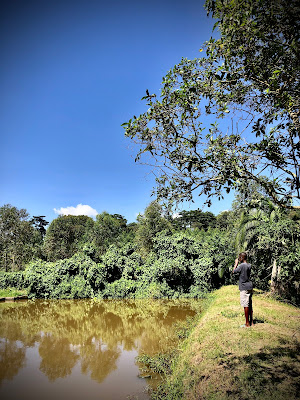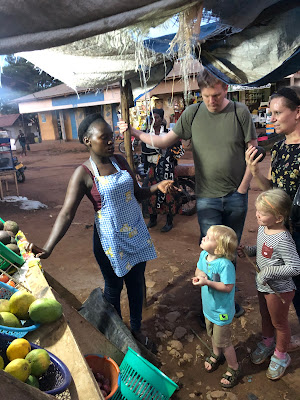God created human beings; he created them godlike, reflecting God’s nature. He created them male and female. God blessed them: “Prosper! Reproduce! Fill Earth! Take charge! Be responsible for fish in the sea and birds in the air, for every living thing that moves on the face of the Earth.” (Genesis 1:26-28 MSG)
Be responsible. Be responsible for… Earth itself.
When the Go Green holiday program theme popped into my mind nearly a year ago, it sounded like fun. I grew up loving the story of the Lorax, I think reducing, reusing and recycling are important, and I find peace and comfort in nature. This would be an easy theme to bring to life for a few weeks. The children could learn a lot.
And they did! In January we ended our long holiday with two weeks of Go Green, leading the children in activities about the water cycle, The Lorax, energy, pollution, and holding a two-month-long recycling contest where the children collected a total of 269 kilograms of plastic to sell to a local recycling plant. It was a big hit for all ages.
A volunteer had planned to come during that time and had already prepared dozens of Go Green crafts for the children, but had to change her plans and come the following holiday instead. Because of that, and because of the enthusiasm of the children, we decided to extend our whole Go Green theme to a second holiday as well.
Knowing my mom was the one who first instilled a love of nature and consciousness of the environment in me, I asked if she was interested in coming up with some ideas and activities we could do within the theme. I expected a few games and crafts to teach the children about caring for the environment. What I got was a whole curriculum. She wanted to teach the children not only how to care for the earth, but why.
Before I saw my mom in the Netherlands in March, she sent me this message:
“Just so you know, I am bringing books and resources and games for the holiday program, on the topics of: God’s creation—biodiversity, endangered species—stewardship, conservation—environmental connections, sustainability—renewable energy, water, trees. Do these work for the broader Go Green theme?”
Do these work for the broader Go Green theme? Did she seriously just ask that? That woman had taken the theme far beyond making a fun three weeks for the children. She wanted it to be downright impactful.
When we met in the Netherlands in March, she brought two suitcases with her. The small one had her clothes and personal items she would need for the week’s visit. The big one was full of Go Green activities for us to bring to Uganda.
The more I read through what she prepared, the more excited I got… and the more daunted. This responsibility of caring for the earth is a big thing. And we are messing it up pretty remarkably. How on earth were we going to convince 100 children that a) the earth desperately needs our help and stewardship, and b) what they do actually matters?
When the holiday finally arrived, we started from the beginning… the very beginning. One hundred primary school children gathered in the church (not to make it more spiritual, but because that is the biggest meeting space we have). We read Genesis chapter 1, ending with the passage above.
“Be responsible!” we repeated.
“Be responsible!” we challenged one another.
“Be responsible!” we reminded ourselves.
That day, we began to explore what that responsibility looks like. From the soil to the sky, from insects in front of us to species long extinct, from the pages of God’s word to the beauty of God’s world, we learned.
We read a book about Jane Goodall and her life with the chimpanzees. She emphasized how she did not go into the jungle with the aim of changing anything about them or their lifestyle; she wanted only to learn, and learning took time and patience. We picked up our binoculars and looked at the area around the fish ponds with new eyes. There were no fish to be seen, but the insects and birds came in abundance. Then we went to the farm, past the goats, through the mango grove until we could see the valley behind Noah’s Ark. What used to be covered in forest is now speckled with half-finished houses and flourishing vegetable gardens. Sitting under the mango trees, we closed our eyes and kept silent for a few minutes, remembering that we can experience nature through more than sight. The animals, ignoring our moment of silence, filled our ears with hums and chatter and bleats and buzzes. “Be responsible!” they whispered to us.
We followed step-by-step instructions and learned how to draw safari animals—warthogs and giraffes and elephants and crocodiles. After using crayons and watercolors to paint the beasts and their habitats, we laid them out on the basketball court. “This is a habitat,” we said, “where all these animals can live.” Then we built a house in the middle. It was small and took the place of only one animal and its habitat. But the people in the house needed food, so they removed two more papers to make space to plant their gardens. Before long, a few more people moved to the area, and what began as neighbors soon became a village. More animals gone. The habitats were beginning to separate. We pretended to be monkeys moving from one side of the forest to the other, following the animal-habitat papers. We got stuck. Our imaginary power lines made it worse. By the time the city came, there were only a few animals left, crowding onto the fringes of what was once their home. “Be responsible!” they told us.
We read The Lorax out loud—a creative, heart-wrenching children’s story with made-up words and a call to action for young and old alike: “Unless someone like you cares a whole awful lot, nothing is going to get better, it’s not.” Do we care enough to make things better? We made our own truffula tree craft and did a worksheet on the cause and effects of actions taken by different characters in the story. “Be responsible,” Dr. Seuss warned us.
We filled 97 cups with saltwater and 3 with freshwater and asked the children to guess how much of the water before them was suitable for drinking and cooking. “This represents the world,” we said. Water is everywhere, but it is also a precious commodity. Here on the compound, we are blessed with clean water that comes right from the faucets—a given in America, but almost unheard of in Uganda. We reminded one another that our closest neighbors have to walk uphill, balancing heavy, water-filled jerrycans on their heads just to have water for cooking, bathing, drinking and washing. We followed Drip the Raindrop through the water cycle and noticed that he never appeared or disappeared; he just changed places and form. “Be responsible,” he encouraged us.
We each took a card and looked at the word. Some of us were flowers, some stones, some animals or other living things. We passed a ball of string around and made a web in the middle, each of us pinching our own tiny section that connected us to the others. One by one, we let go. Perhaps a dam was built that flooded all the flowers from a field. The bees felt it. Perhaps people chopped down a section of forest to build a school. The soil felt it. We played Jenga, imagining each block as a small but integral part of an ecosystem. With a few missing pieces, the tower was unstable, but still standing. When we removed more pieces from that ecosystem, however, even the remaining blocks could not stand. “Be responsible!” they cried as they crashed down.
We made it our goal to find every piece of unused plastic on the compound—old jerrycans, yoghurt containers, broken pipe, discarded ice cream spoons, and everything in between. We searched the schools, the rubbish bins, the forests, the farm, the incinerator. We collected the plastic in classrooms until they were practically full to overflowing and our oversized sacks couldn’t get back out the doors. We painted recycle bins with “Reduce, Reuse, Recycle” and “Hard plastics only!” and strategically placed them around the compound. We painted signs that said “Go Green!” and hung them from trees and buildings. “Be responsible!” we pleaded.
At the end of the holiday, I got an email from my mom.
“Here’s what I wrote while working on the program,” she said, “which was within my morning prayer:
What are my hopes for the things I am working on for the holiday program?
I hope to have done something that is helpful and useful for Katie (ease her burdens);
I hope to help the children (of all ages) have a better understanding of your creation so that they might be better stewards, finding renewal and peace and energy and joy in your creation;
I hope to help the children enjoy learning about nature and to see familiar things through new eyes;
I hope to help the children (and adult leaders) know that individuals can make a difference, we can do better, and there is hope for the future.
These are the things I pray for. And I leave this prayer open to the things you might do that I can’t even imagine.”
Unless someone like you cares a whole awful lot, nothing is going to get better, it’s not. Let’s take up our responsibility today, and every day. Let us be responsible for Earth itself.






















